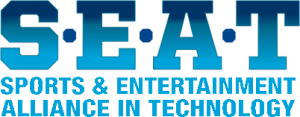
Last week, I attended the 9th Annual SEAT Conference (Sports & Entertainment Alliance in Technology), which is always one of my favorite events of the year. I’ve been an active member of the CRM/Analytics Track Steering Committee since that track was added back in 2012, so every year we have 2-3 days of “geeking out” around all sorts of data and digital related topics.
Sometimes at these events, it’s hard to keep track of all the great examples and insights being shared, but I try to use some of my “live-tweeting” as a digital notebook. So I’m going to pull out some of my tweets from last week to use as the basis for my conference recap!
Great night at @LevisStadium with #SEAT2015 pic.twitter.com/ZdTVoUGufr
— Russell Scibetti (@rscibetti) July 20, 2015
The conference kicked off (pun intended) at Levi’s Stadium, with three different technology related tours. I went to the Fan Engagement themed tour and came away very impressed with what the team has done with their gameday programming, mobile experience and fan loyalty program. It was clear that technology was on everyone’s mind as that venue was being developed. They also did an incredible job with their team museum, providing another way to deliver a great fan experience independent of what happens on the field each game.
Cool diagram of the flow between partner systems to create cohesive fan experience #SEAT2015 pic.twitter.com/ipv1me9BNG
— Russell Scibetti (@rscibetti) July 20, 2015
Key is open collaboration (esp between team and biz) so you can take advantage when inspiration strikes #SEAT2015 https://t.co/tVVmlQzMdI
— Russell Scibetti (@rscibetti) July 21, 2015
A big theme this year was collaboration, which can take all forms: across different departments, between seniority levels, and even between partners on behalf of a team’s overall goals. The first tweet shows how technology partners can all interact within a single team’s ecosystem, and the second tweet (both the original content and my RT notes) emphasizes how open communication by the Golden State Warriors helped them take full advantage of the team’s success via digital, sponsorship, media and more.
And from @arentmee, remember to start with your business goals rather than starting with the data or the product. #SEAT2015
— Russell Scibetti (@rscibetti) July 20, 2015
This is VERY important advice and another important theme. Before you focus on the data itself, you need to identify what your goals are. This way you can collect the RIGHT data that can answer the RIGHT questions. Otherwise you end up with lots of data and lots of questions without many answers. (To hear more about this, make sure to download the upcoming Sports Geek podcast I recorded with Sean Callanan.)
Who owns the data? Do you fans want to be tracked throughout the building? Great questions by @estebankolsky #SEAT2015
— Russell Scibetti (@rscibetti) July 20, 2015
Fans are trading privacy for value or convenience but you need their permission to do it. @rwang0 #SEAT2015
— Russell Scibetti (@rscibetti) July 20, 2015
I put these two tweets together because they address the same fundamental issue – who owns the data and do our fans want us to use it? Clearly we have more ways to learn about fans than ever before, but just because you can do something doesn’t mean you should. We always need to keep the fans’ interests in mind – find out if the benefits to them are worth what they have to share to get them. Transparency and permission are key!
Very impressed with how @jbreedlove13 uses data visualization to help the org tell the right stories and make better decisions #SEAT2015
— Russell Scibetti (@rscibetti) July 21, 2015
It is absolutely critical that we focus not just on collecting data, but how we report on and communicate that data so we can make better decisions about it. In this sessions, the panelists were able to show how they took key questions from management and designed visualizations that made the relevant data easier to consume and understand.
Finally, I couldn’t tweet during the panel I moderated on CRM Best Practices, but in that session we talked about the “Crawl, Walk, Run” approach to how your CRM strategy evolves over time within an organization. We had great examples such as how one team documented every part of the sales process and identified how some steps could be streamlined as a way to improve adoption, and another team pre-populated simple, key customer data points in the optimal locations so that the right data was used in the right conversations.
Big thanks to Christine Stoffel and the entire SEAT Conference team for all their hard work last week!


